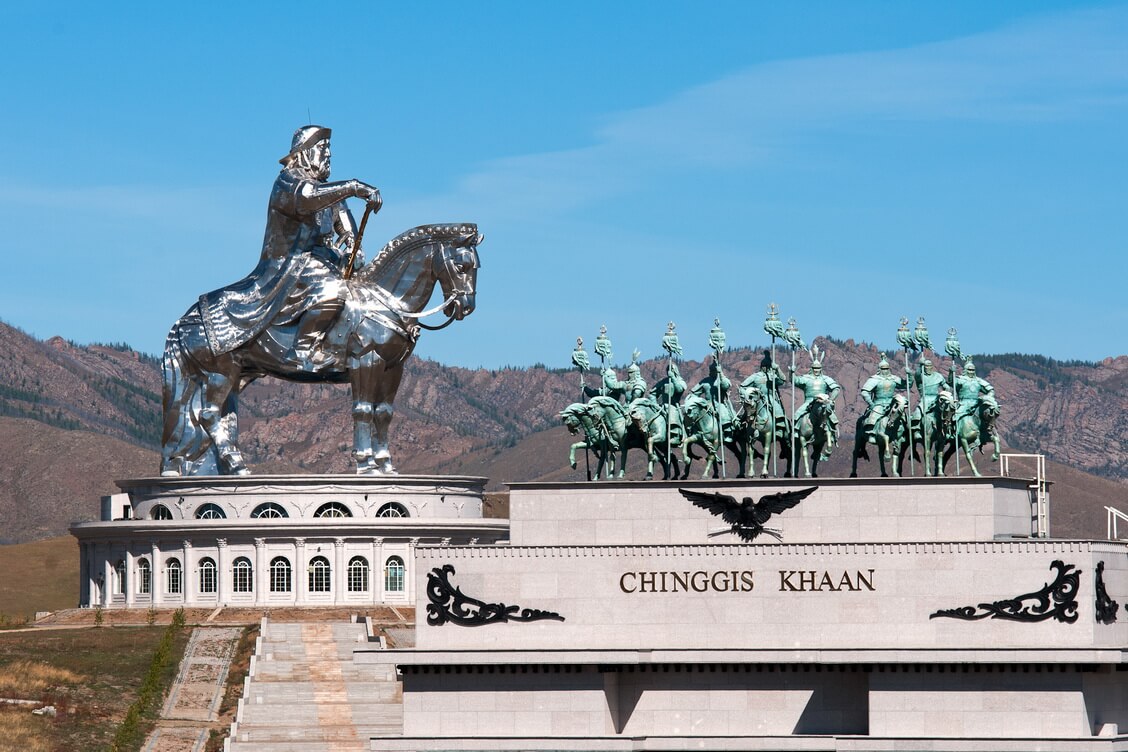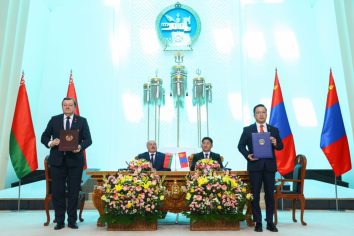During his visit to Ulaanbaatar, Alaksandar Łukašenka lashed out at the local opposition, defending his decision to support Russia’s invasion of Ukraine.

The Belarusian ruler flew to Mongolia because there were not many other countries he could go to. In 2021, two-way trade amounted to $43.6 million.
Tough market
More recent data on trade is not available because the Belarusian National Statistics Committee (Biełstat) keeps that information secret from the public.
“We haven’t come here to find some profit. We have a negligible trade turnover of about $30 million,” Łukašenka acknowledged.
Although he was accompanied by a large group of officials and businesspeople, a breakthrough in two-way trade is highly unlikely.
Mongolia is a small and distant market. It has less than 3.5 million inhabitants and its GDP is much smaller than that of Belarus.
Besides, it is not easy to enter that market, where China and Russia already have a strong presence.
Łukašenka hinted that Belarusian companies are ready to give it a go. “If Mongolia is interested in our technologies – and we can solve any problem for you – we can offer fair competition to any state located here next to you.”
Sounds like a plan, but so far China is outpricing Belarus even in Russia.
After the talks, the two leaders signed a treaty on friendship and cooperation, apparently a very general, declarative document.
Łukašenka realizes that a breakthrough is hardly possible. “We do not suffer from gigantomania. We understand very well our relations and our place in Mongolia’s relations with other countries. We would like to start with something good, something big with you – three or four projects, so that we can convince your people, your leadership, your journalists and your opposition that we can do something. Let’s define those three or four projects.”
In other words, joint projects have not even been defined yet. Why did he come to Mongolia in the first place?
The answer is simple: the Belarusian ruler, under sanctions for suppressing protests and complicity in the Russian war against Ukraine, is not welcome in many places.
Former Mongolian president calls Łukašenka a criminal
Days before the visit, Tsakhiagiin Elbegdorj, a former president of Mongolia, urged Ulaanbaatar to arrest Łukašenka for committing crimes against humanity in Belarus. He described the Belarusian ruler as a “rogue dictator trying to promote the Kremlin project.”
Belarusian opposition leader Śviatłana Cichanoŭskaja welcomed Elbegdorj’s statement. Her associate Pavieł Łatuška has long urged the International Criminal Court (ICC) to issue an arrest warrant for Łukašenka.
Mongolian opposition angers visitor
Łukašenka has put his political opponents in jail, forced them into hiding or driven them into exile. In Mongolia, probably to his surprise, opposition activists staged a protest against his visit. He was also infuriated by criticism in the local media.
He said that some Mongolian journalists were “simply biased.” “Do not portray us as enemies of the Mongolian people. We are your closest friends and brothers,” he said.
Łukašenka’s lectures
Mongolia, with its of rampant corruption, is far from a perfect democracy. But this country, which many people used to consider backward in every way, is much more democratic than Belarus.
Łukašenka promoted dictatorship during his stay. “Power should be as hard as a fist. No one holds power with unclenched fingers,” his press office quoted him as saying.
Mongolians are perfectly capable of finding out for themselves what government suits them better. They may be unwilling to smash relations with democracies to pieces, which is what Łukašenka’s authoritarian regime has done.
“You conduct your foreign policy very delicately, carefully balancing between these forces,” Łukašenka said in an apparent reference to Russia and China.
“You have endless wealth. You have everything in the soil, even things you can only guess at, so do you think you will be allowed to live in peace?” he exclaimed in his characteristic enemies-all-over style.
During his visit, Łukašenka mentioned Mongolia’s natural wealth several times. He is always jealous of other countries rich in natural resources, probably, because the West often turns a blind eye to lack of democracy in oil-rich countries. That may be a reason why, time and again, the Belarusian ruler calls on his subordinates to drill for oil in Belarus.
Kremlin’s mouthpiece
The former Mongolian president was right to say that the Belarusian dictator would promote the Kremlin’s agenda.
According to Łukašenka’s press service, Łukašenka pushed back against criticism in Mongolia in connection with Russia’s war and support provided by Belarus.
Łukašenka drew a far-fetched parallel between the Kremlin’s war and Genghis Khan, playing on the Mongols’ reverence for the founder of the Mongol Empire.
Łukašenka’s speech was full of false claims and manipulations. According to him, Genghis Khan, who conquered vast territories inhabited by many ethnic groups, only “fought for the country and protected his people.”
“If anyone dared to offend his warrior, he wiped out the settlements and these people with sword and fire. What has happened between Ukraine and Russia? The same thing,” he claimed.
In his view, Middle Ages cruelty is OK nowadays. Actually, he might be earnestly praising the cruel practices because that’s what he has plunged his country into.
But there is a huge difference between Genghis Khan and Russia.
Unlike Russian leaders, Genghis Khan did not sign international border treaties. There was no UN, no Helsinki Accords and no Budapest Memorandum.
By attacking Ukraine, Russia violated international law. Brutal wars that were commonplace in the 13th century are a monstrous challenge to humanity in the 21st century.
Ukraine, Russia, China, United States
The Western countries used Ukraine to prepare an attack on Belarus and Russia and prompted it to introduce sanctions against Belarus, he claimed.
“Ukraine was the first one to impose sanctions on us. Our dear, friendly Ukraine. . . We didn’t attack them and we didn’t tell them how to live,” Łukašenka said.
He also repeated the Russian propaganda narrative accusing Ukrainians of “burning Russian people” in Odesa to justify the aggression.
Ukraine allegedly failed to fulfil the 2015 Minsk agreements, using the ceasefire to arm itself against Russia, Łukašenka added.
“How should Russia have behaved? Why do Mongolians . . . condemn Russia and all the more Belarus, which acted as a guarantor of peace talks?” he said, accusing the West of pushing Ukraine to reject peace talks and continue confrontation.
“Russians do not want this war,” he said. “I know it well. Why not sit down at the negotiating table? Why not come to an agreement? The Americans want to sink Russia in this confrontation.”
He added that the United States uses the war between Russia and Ukraine to weaken China.
